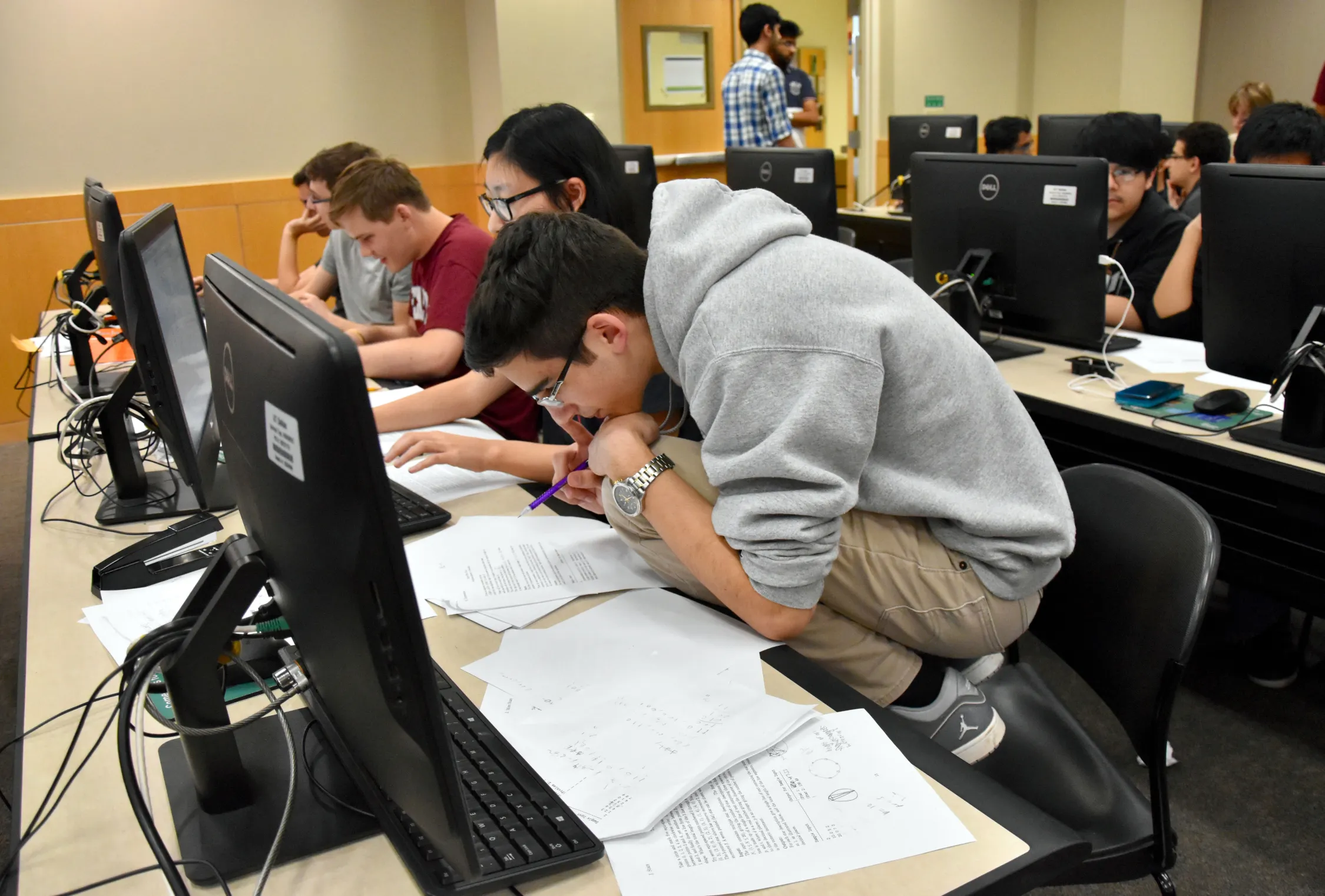Biannual Battle of the Brains Programming Contest Challenges High Schoolers From 26 High Schools From All Over North Texas

This spring the biannual Battle of the Brains High School Programming Contest brought in 100 teams from 26 different North Texas high schools. For more than a decade, the UT Dallas Computer Science Department has been conducting a statewide “Battle of the Brains: High School Programming Contest.” The contest, which follows ACM (Association of Computing Machinery) International Collegiate Programming Contest (ICPC) style, is held twice a year at the UT Dallas campus with UT Dallas CS professors, Drs. Ivor Page and Jey Veerasamy, overseeing the contest.
The Spring 2017 Battle of the Brains Programming competition was held on April 1st, with State Farm Insurance sponsoring the event. Registration for the Fall ’17 competition was free, thanks to the sponsorship. As usual, the contest began at 10 in the morning, following opening remarks from Dr. Gopal Gupta. Subsequently, students adjourned to three separate computer labs to start the 40-minute practice portion of the contest. Immediately following that was the main contest, which lasted three hours. Teams of up to three high school students completed simultaneous novice and advanced contests. Every team was given the same ten problems to solve for both levels and was allowed to use only one of the UT Dallas’ lab computers. To solve the problems, the students were allowed to use only Java, C, or C++.
The contest utilized PC2 (Programming Contest Control system) for semi-automatic judging. When scoring the contest, equal points were awarded to each question, even though they may not have been equally difficult. In order to break ties, the judging system utilized penalty points. If the question was not answered correctly, then the penalty points for that question was zero. If a correct submission occurred for a question at time T minutes, then T penalty points would have been added, plus 20 penalty points for each incorrect submission for that question.
Below is the final list of winning teams for both the advanced and novice levels.
| Advanced Level Winners | Novice Level Winners |
|---|---|
| 1. Richardson High School | 1. Richardson High School |
| 2. Cypress Woods | 2. Coram Deo Academy |
| 3. Plano West Senior High School | 3. McKinney High School |
During the award ceremony, Dr. Ivor Page and Brad Flachsbart a State Farm Director in Product Solutions shared some insights with the high school teams and their coaches. He advised the students to keep in mind some useful advice as the students journey through their education, “It is very impressive to see all the brainpower in this room. I want to urge you all to continue with your pursuit of technology and education; you all are off to a great start.” He continued on saying, “My one piece of advice would be to ‘stay flexible’ because technology is changing so fast that it is JavaScript today, ember tomorrow, and something else we haven’t even thought next week. So, just be flexible and work with it.”
Dr. Page ended the award ceremony by thanking the teachers noting, “This whole event would not have happened without your teachers, these people are incredibly valuable to not only you, but to me and everyone else out there! Without them, I wouldn’t be here! They love seeing how fast you grow and how well you do in your life. Your teachers are real salt of the earth individuals and I admire them.”
The next Battle of the Brains: High School Programming Contest will be held this fall at the UT Dallas Computer Science Department.
Click here to view all the photos from the Spring’17 Battle of the Brains Programming Competition.
ABOUT THE UT DALLAS COMPUTER SCIENCE DEPARTMENT
The UT Dallas Computer Science program is one of the largest Computer Science departments in the United States with over 2,100 bachelor’s-degree students, more than 1,000 MS master’s students, 150 PhD students, and 86 faculty members, as of Fall 2016. With The University of Texas at Dallas’ unique history of starting as a graduate institution first, the CS Department is built on a legacy of valuing innovative research and providing advanced training for software engineers and computer scientists.




